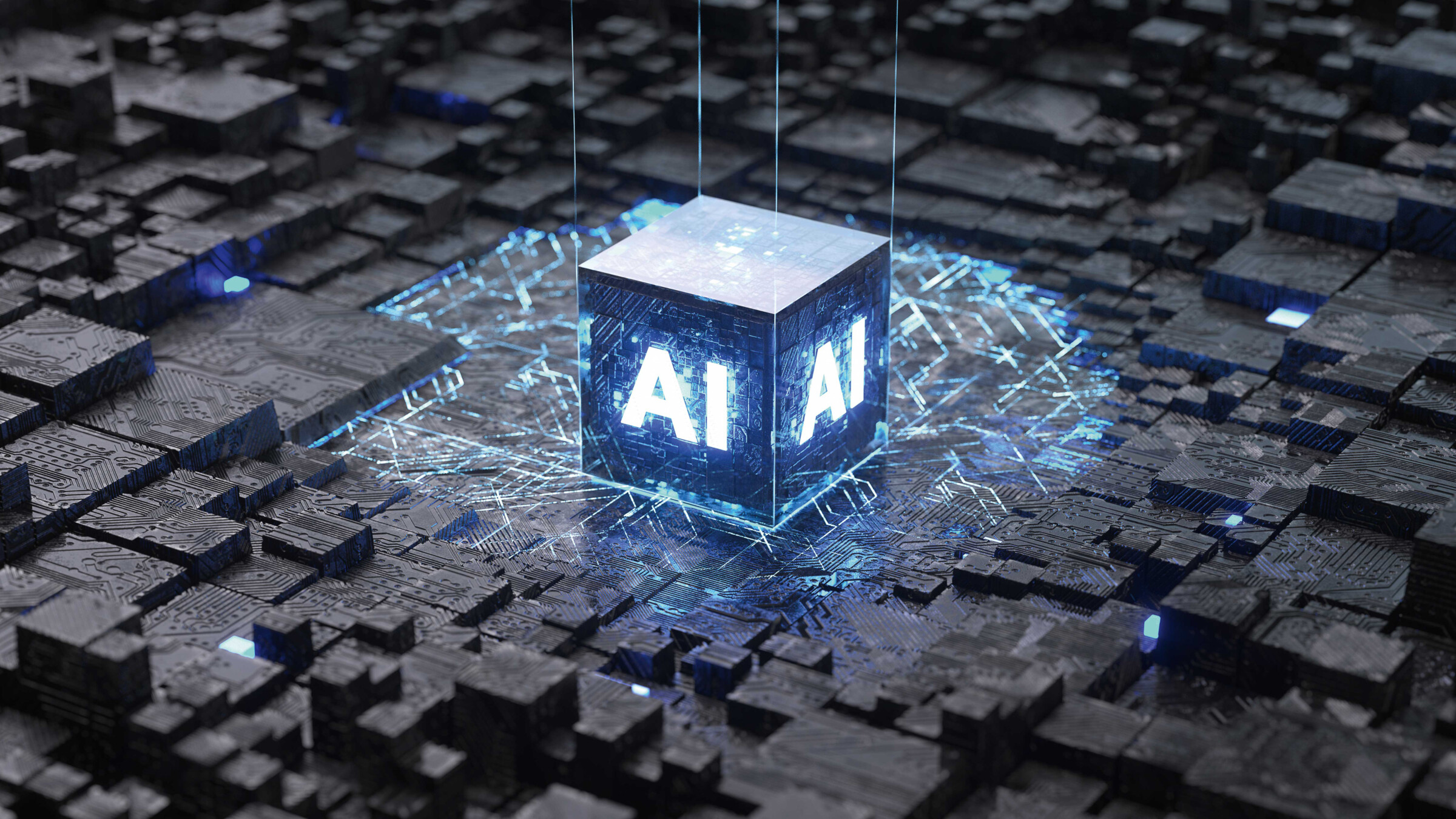
The potential of Artificial Intelligence (AI) in production is becoming more and more apparent. At the same time, the range of AI functionality in automation is also increasing. Mitsubishi Electric unites a diverse range of such features under its Maisart brand. SPS-MAGAZIN asked its European headquarters in Ratingen about the areas of application they are targeting and whether these features are truly already operational.
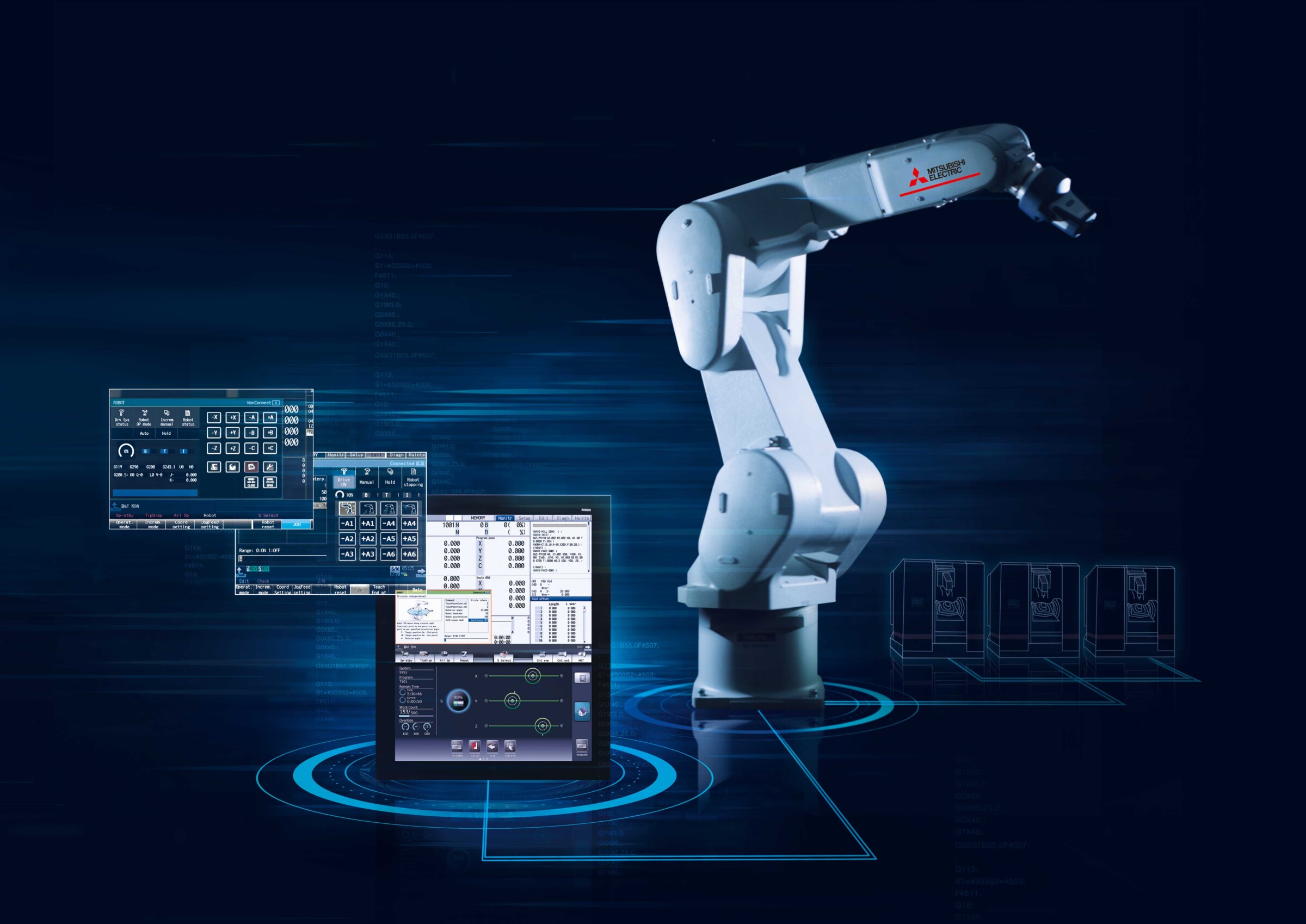
Robot training up to 90% faster than manual methods
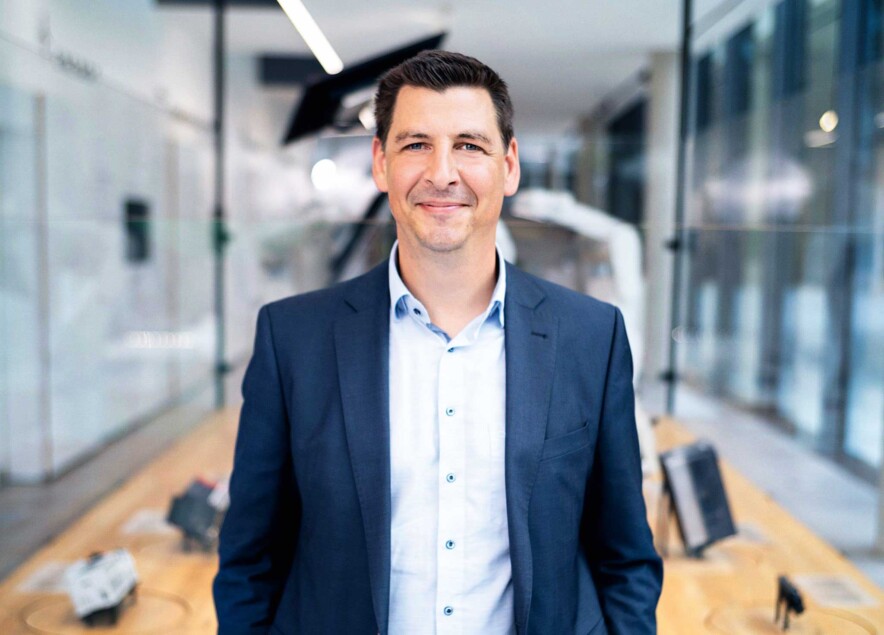
Stefan Knauf, Division Manager Industrial Automation at Mitsubishi Electric
By using Artificial Intelligence, Mitsubishi Electric is making its products not only smarter, but also safer and more user-friendly. As a consequence, the company aims to position its Maisart AI platform not just in the business sector of automation technology, but holistically across a broad spectrum of industries. For example, the intelligent algorithms from the AI range are already being used for the control of air conditioning systems, the navigation of mobile units and the predictive maintenance of robots. Technologically, the platform combines such diverse approaches as Deep Learning, Reinforcement Learning and Big Data Analytics. But how are such users as machine manufacturers and production companies benefiting from this technology? Division Manager Stefan Knauf and Marketing Manager Jan-Philipp Liersch provide the answers.
Using Maisart, Mitsubishi Electric has managed to dimension neural networks to fit into firmware.
Stefan Knauf, Division Manager Industrial Automation at Mitsubishi Electric
Stefan Knauf: Currently, more and more AI features developed in-house are being translated into concrete products. We are already providing such Smart Plus options in automation systems for controllers, servo drives and robots.

Jan-Philipp Liersch, Marketing Manager Industrial Automation at Mitsubishi Electric
Jan-Philipp Liersch: In doing so, we are pursuing a special approach, because Maisart doesn’t force the user to generate added value solely via the cloud and with a troop of data scientists. On the contrary, our philosophy is to apply AI right where the data is generated. Only then is it possible to draw conclusions directly and feed measures straight back into the process, i.e. the machine. Data traffic, server capacity and the necessary security efforts are reduced at the same time.
Knauf: In some cases, not only are the structures simplified, but also the business processes. Because not all data records necessarily have to be forwarded to higher levels – Smart Data takes precedence over Big Data: data recording, sorting and evaluation. As a result, the user can quickly and easily integrate AI functions into the process via Mitsubishi Electric hardware. If required, however, comprehensive and tailored data analysis is also of course possible, e.g. at the edge level. Maisart is already being used by some customers here as well.
The user can start with individual AI functions and later extend them to the entire factory.
Jan-Philipp Liersch, Marketing Manager Industrial Automation at Mitsubishi Electric
Knauf: Supplying the complete battery of algorithms doesn’t get us very far. Instead, we start the other way round and ask the customer what goal he has or what problem he wants to solve. In terms of a manufacturing process, it is mostly about ways of preventing errors. And about the factors that have any effect at all on the product’s quality. That’s why our approach deliberately involves the people at the machine. After all, they usually have the most experience and know the sticking points in the process best.
Liersch: Until a data analyst finds weak points in the cloud, you may in some cases waste a lot of time. The use of a Big Data solution is therefore much more elaborate than using locally collected data. Especially if you talk directly to the people responsible for the various process steps about the data relevant to them. You don’t get AI off the peg.
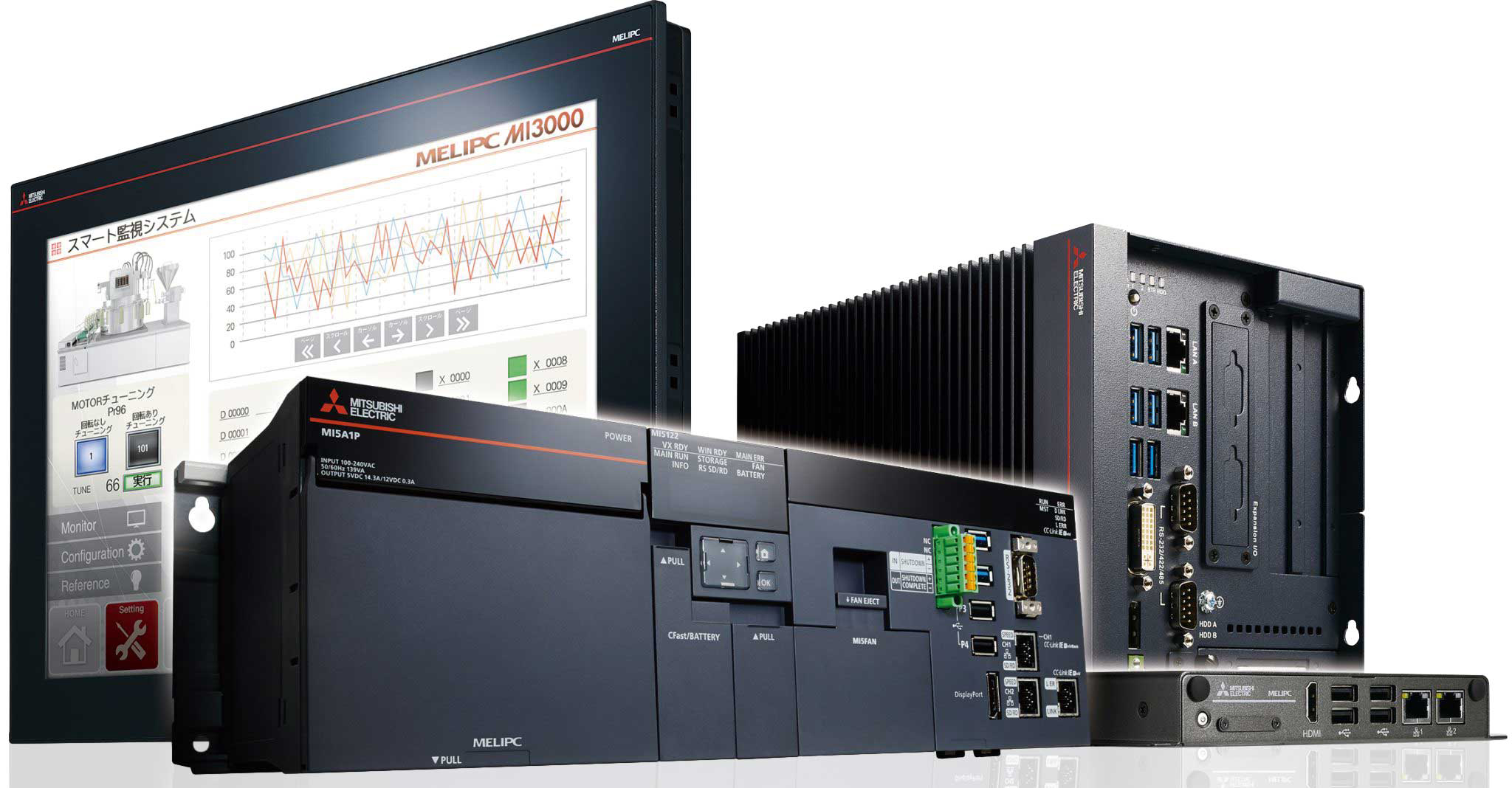
With its MELIPC controllers, Mitsubishi Electric brings Artificial Intelligence in manufacturing to the control level.
Liersch: Correct. Also because machine makers and end users have different degrees of experience with AI. We have customers who have already gathered a lot of experience of data analysis. We can engage with them on a highly advanced level. Other companies are still having difficulties getting their minds round the issue. That’s when you have to start at the beginning, with the AI basics.
Knauf: But whether it’s an SME, a corporation, machine operator or technical manager, it always takes someone with an idea to create future added value with AI. The big visions tend to come from the upper echelons. The hands-on ideas usually come from the shop floor. Ultimately, however, Artificial Intelligence must be adopted across the board at all levels. In this respect, it is currently easy to see growth in both the range of applications for AI and the willingness to use it.
Liersch: One area where this is very clearly visible is robotics.

Maisart® is Mitsubishi Electric’s brand of AI technology. The name stands for “Mitsubishi Electric’s AI creates the State-of-the-ART in technology.”
Liersch: Robotic systems are becoming increasingly complex. Smart algorithms and sufficient computing capabilities are needed to keep the applications manageable. The best example is the trend towards direct cooperation between humans and robots. Artificial intelligence is needed to make this safe and sensible. Without it, a robot like Mitsubishi’s Melfa Assista, which converts from a classic industrial robot into a cobot at the touch of a button, would be unthinkable. The kinematics are even so intelligent that additional sensors can be dispensed with in many places. The intelligent control alone gives it collaborative abilities.
Knauf: Another area where we can easily observe the development of AI features is industrial image processing. AI has been in use here for many years – in distinguishing between good and bad parts, for example. Thanks to growing computing power and improved algorithms, robot vision continues to advance. So much so that robots today have mastered the variety of parameters necessary, for example, to perform the quality control of produce in the food industry, i.e. fruit and vegetables.
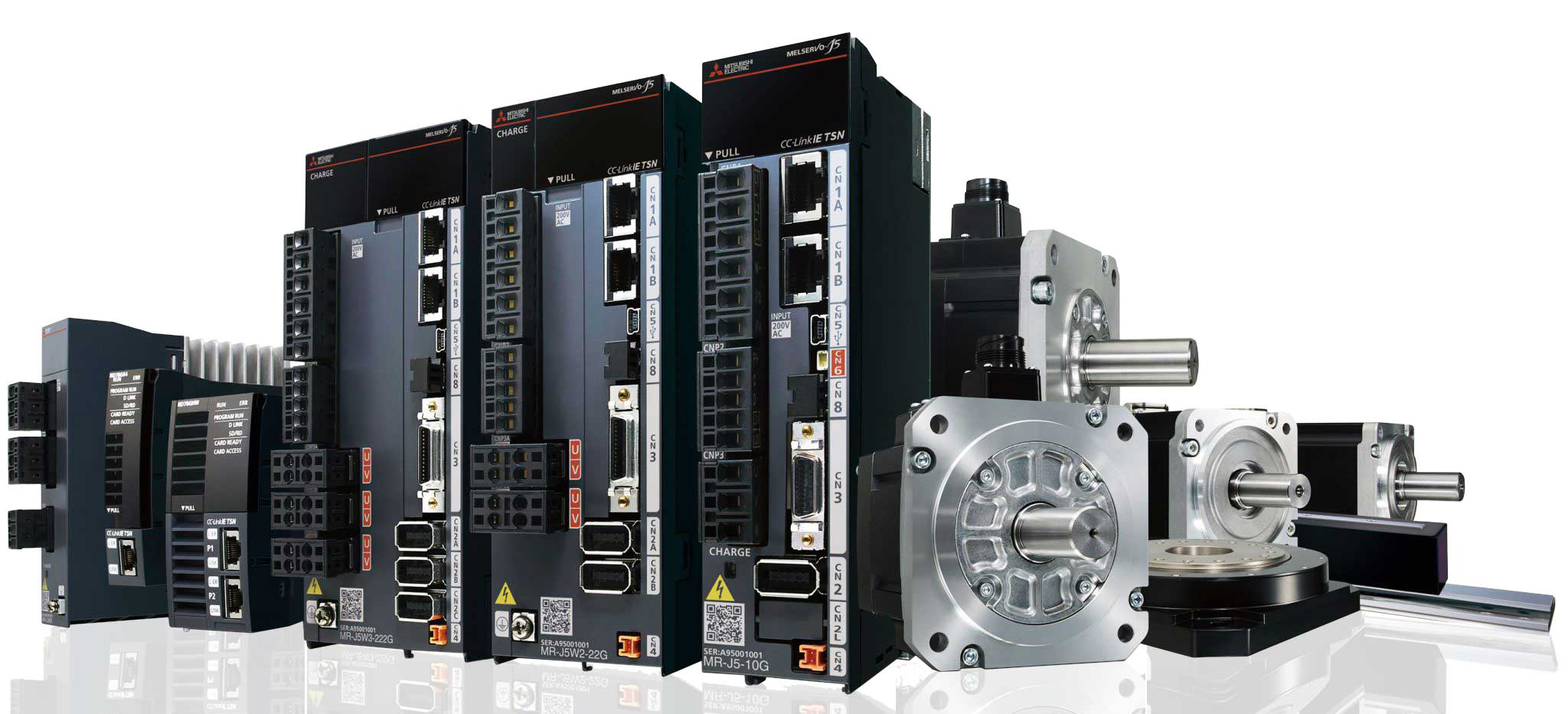
AI for the next generation: the firmware of the new MR-J5 servo family is already equipped with intelligent Maisart algorithms.
Liersch: This is one of the main keys to success. That is why we attach top priority to the straightforward applicability of AI functions. Whether it’s options like temperature compensation, force/torque control or autonomous path planning, our AI solutions of course use complex models. But we prepare them for easy use so the user doesn’t have to have a lot of AI know-how.
What’s more, he can also start small, with individual functions on a machine. Step by step, he can then extend the use of Artificial Intelligence to the entire factory via the edge level or the cloud. The Maisart concept is also designed for this from the outset.
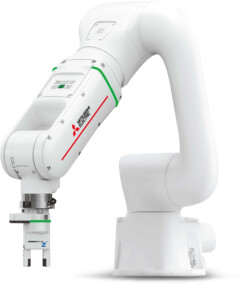 Is your current generation of automation hardware already fully AI-capable?
Is your current generation of automation hardware already fully AI-capable?Knauf: Using Maisart, Mitsubishi Electric has managed to dimension neural networks to fit into firmware. This is now being applied to more and more products from the Mitsubishi Electric portfolio and – because Maisart is implemented across all divisions – is also finding its way into a growing number of applications and industries. From automation and building services to automotive.
On this journey, I think it is easy to appreciate that the time really is ripe for the application of AI in production. More and more users have grasped the potential inherent in it. The generation change among engineers and technicians is also contributing to growing awareness. Last but not least, people are coming into increasing contact with Artificial Intelligence in everyday life.
Knauf: Definitely. Ultimately, a prerequisite for Maisart’s success is getting our own team ready for Artificial Intelligence. Only then we can bring AI functions to the market on a large scale. To be honest, this is a lengthy process that we are still in the middle of.
Liersch: Our e-Factory network is a huge help here. Because it offers incredibly versatile extension options wherever Mitsubishi Electric’s portfolio has its limitations. And so there are many companies among our partners that already have special tools for the implementation of AI – and provide valuable support for such applications.
Mitsubishi Electric’s big goal with Maisart is to implement a real industry standard for AI in the market – the abbreviation stands for “Mitsubishi Electric’s AI creates the State-of-the-Art in Technology”. And, as we all know, this is best done hand-in-glove with partners and the customer.
SPS-Magazin 2/2022
Mitsubishi Electric’s Melfa Assista robot delivers the same precision and positioning accuracy as a conventional industrial robot, but is easy to operate and switches between cooperative and collaborative use at the touch of a button. It reliably carries out complex assembly tasks while reacting flexibly to changing conditions. Set-up is simplified by a direct teaching function. The position is stored on the keypad built into the robot arm. For more complex travel paths, there is also visual programming software that allows motion functions and individual adjustments to be programmed on a tablet computer by drag & drop – without any special knowledge of robots. The Melfa Assista has a repeat accuracy of ±0.03 mm at a nominal load of 5 kg and a reach radius of 910 mm. The range of possible applications includes laboratory automation, precision assembly, high-grade packaging and component handling.
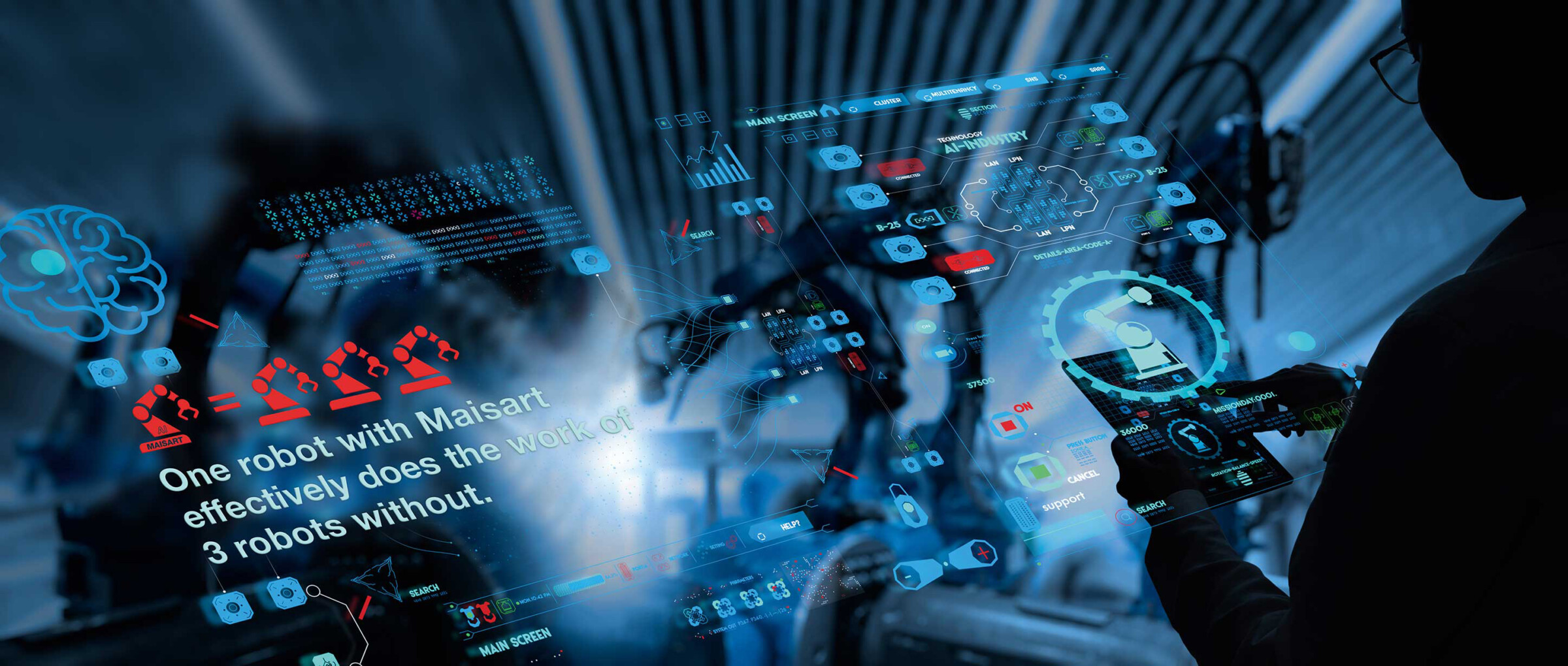
In the assembly of PCBs and insertion of mechanical parts, cycle time has been slashed from 5.5 seconds to 1.9 seconds. What is it that Maisart does differently?
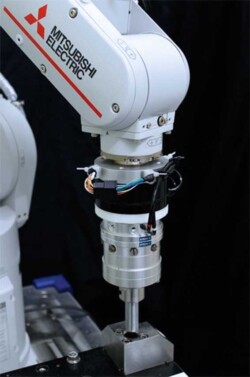 Automation is becoming increasingly important in modern industrialised countries. This stems from a combination of labour availability and economic factors. The conventional route was time-consuming and resulted in significantly higher cycle times.
Automation is becoming increasingly important in modern industrialised countries. This stems from a combination of labour availability and economic factors. The conventional route was time-consuming and resulted in significantly higher cycle times.
Until now, automated systems for precision assembly and placement operations have required programming and parameter setting by skilled personnel to achieve the flexibility of assembly processes performed by humans. These requirements increase assembly costs and time, which manufacturers want to reduce.
Thanks to Mitsubishi Electric’s Maisart AI technology, the new, rapid force-feedback control algorithm cuts assembly time and prevents the assembly robots from moving too vigorously. The technology allows task parameters such as speed to be set quickly and precisely. High-precision force sensor data in particular can be accessed without the need to pause the robots. Conventionally, robots are halted before force-feedback control is introduced – but Mitsubishi Electric’s new algorithm now eliminates this step.
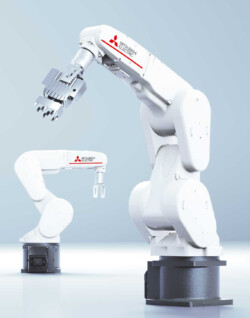 The new AI technology facilitates rapid and incremental learning using Maisart’s enhanced learning capability, which represents a vast improvement over traditional methods that take an enormous amount of learning time to examine various data inputs and their combinations. Mitsubishi Electric has harnessed its expertise in industrial automation, machine tools and autonomous working technology to refine the learning capabilities of AI and facilitate the progressive learning of work processes. Instead of learning all the technology at once, the company has simplified the content and added easy, automatic step-by-step learning to accelerate and streamline the learning progress. Internal tests have shown that the time taken to write the program is only a tenth of the time taken for manual processes.
The new AI technology facilitates rapid and incremental learning using Maisart’s enhanced learning capability, which represents a vast improvement over traditional methods that take an enormous amount of learning time to examine various data inputs and their combinations. Mitsubishi Electric has harnessed its expertise in industrial automation, machine tools and autonomous working technology to refine the learning capabilities of AI and facilitate the progressive learning of work processes. Instead of learning all the technology at once, the company has simplified the content and added easy, automatic step-by-step learning to accelerate and streamline the learning progress. Internal tests have shown that the time taken to write the program is only a tenth of the time taken for manual processes.
To reduce cycle time (average time between the production of one unit and starting work on the next) when using such production equipment as industrial robots, skilled workers usually have to make numerous settings on the production equipment. With Mitsubishi Electric’s new AI, on the other hand, adjustments to route, speed, acceleration, etc. are performed automatically. The procedure is learned beforehand in a simulator so the AI can automatically make changes to shorten the cycle time without using an image sensor. The outcome is productivity equalling or even surpassing that of equipment set by skilled workers.
Mitsubishi Electric will continue to use its proprietary AI technology to develop intelligent industrial robots and rapid force-feedback control algorithms for faster and lower-cost assembly systems.
On the example shown, Maisart is capable of accelerating the process to enable one robot to do the work of almost three.
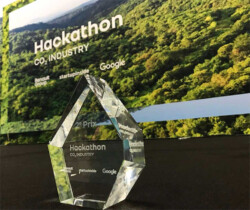 An intelligent data tracking and monitoring solution developed for automotive factories by Mitsubishi Electric has been awarded a coveted 2nd place at the Hackathon CO₂ Industry event organized by Renault and Google.
An intelligent data tracking and monitoring solution developed for automotive factories by Mitsubishi Electric has been awarded a coveted 2nd place at the Hackathon CO₂ Industry event organized by Renault and Google.
The competition entry was put forward by Global Key Account Manager Stephen Methogo and Senior Application Engineer Houari Derraz, Mitsubishi Electric Europe, France. It uses data-tracking to visualize, aggregate and report energy usage in real time. Based on the collected data, it leverages actionable insights from AI to reduce process emissions at shop-floor, factory and global level.
The event was held from 23 – 25th November 2021 at the innovative Renault Refactory based in Flins, France which is dedicated to achieving a circular automotive economy. The factory relies on developing collaborative partnerships and technology to address four main areas of sustainability.
Hackathon CO₂ Industry focusses on the decarbonization of their factories. The event is organized by Renault Group and Google and accompanied by Startup Inside, it is aimed at energy players, industrial equipment manufacturers and digital companies with ‘an appetite for innovations related to the environment’. Stephen Methogo commented: “We are delighted to have won recognition by this event, especially as our work on achieving CO₂ reduction targets within the automotive sector is also at the core of Mitsubishi Electric’s global Environmental Sustainability Vision 2050.”
The MELFA Smart Plus Card reduces downtime by detecting anomalies early on (predictive maintenance).
The predictive maintenance function is used by Maisart to detect and report anomalies in robot drive systems* at an early stage in order to reduce downtime.
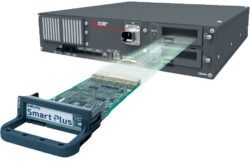 High-precision predictive maintenance is achieved by simply plugging the card into the robot controller without any other device or sensor having to be added.
High-precision predictive maintenance is achieved by simply plugging the card into the robot controller without any other device or sensor having to be added.
Name and place of company:
Mitsubishi Electric
Founding year:
1921
Managing Director:
Kei Uruma
Employees:
146,500
Core business:
Production of electronic devices, e.g. EDM systems, laser cutting systems, CNC controls and drives, industrial robots, air conditioning systems, semiconductor equipment and much more besides
Mitsubishi Electric
Mitsubishi Electric Europe B.V. Mitsubishi-Electric-Platz 1
40882 Ratingen
Germany
Tel +49 (0) 2102-486-0
edm.sales@meg.mee.com
www.mitsubishielectric.de
Fields marked with a * are mandatory.
Mitsubishi Electric Europe B.V.
German Branch
Mitsubishi-Electric-Platz 1
D - 40882 Ratingen
Sales
Tel.: +49 (0)2102 / 486 - 6120
edm.sales@meg.mee.com
Service
Tel.: +49 (0)2102 / 486 - 7600
edm.hotline@meg.mee.com
Applications
Tel.: +49 (0)2102 / 486 - 7700
edm.applikation@meg.mee.com
Spareparts
Tel.: +49 (0)2102 / 486 - 7500
edm.parts@meg.mee.com